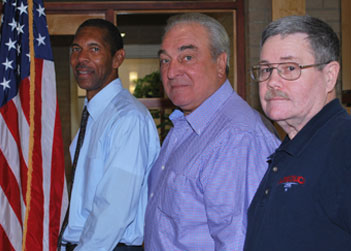In 2 New Programs, the New Jersey Hospital Association Hires Vets to Help Others Navigate the Healthcare System
 NJHA’s Veteran health navigators from left: Don Sanford, United States Air Force; Edward Sadowski, United State Army; Francis “Bud” Funk, United States Marine Corp.
NJHA’s Veteran health navigators from left: Don Sanford, United States Air Force; Edward Sadowski, United State Army; Francis “Bud” Funk, United States Marine Corp.PRINCETON – New Jersey is home to more than 428,000 veterans. For many of them, access to healthcare is a significant issue. Nearly 19,200 N.J. veterans lack health insurance, and only 26.8 percent are registered to receive care from the Department of Veterans Affairs.
Now, two new programs from the New Jersey Hospital Association are training veterans to serve their fellow service members and other N.J. residents as healthcare navigators. These navigators will be stationed in high-need areas of the state and will help veterans and others with insurance enrollment, referrals for screenings and other health services, access to behavioral health services and connections to social service agencies.
“It’s a sad reality that our returning veterans all too often fall through the cracks of our healthcare delivery system,” said NJHA President and CEO Betsy Ryan. “The need for behavioral health support is particularly high. We are fortunate to have a corps of compassionate and committed veterans join us in a new call to service – helping their military colleagues and other New Jerseyans get the healthcare services they need.”
The initiative has two components:
The Veterans Mental Health Care Navigators project, funded in part by a $1.4 million grant from the United Health Foundation, is a three-year project to offer peer support to veterans and military families in need of behavioral health services. Data shows that as many as half of war veterans in the VA system have a mental disorder diagnosis such as post-traumatic stress disorder or depression, but many do not receive treatment. NJHA’s employed veterans will be trained in Mental Health First Aid and help veterans and their families navigate the healthcare system to access the screening, healthcare services and social support they need. Their work will include outreach to veterans groups as well as being stationed in healthcare sites. The program will be focused on the high-need areas of Ocean, Burlington, Monmouth and Ocean counties.
The Community-Based Pilot Project to Reduce Readmissions is funded as part of a $1.8 million contract under the Centers for Medicare and Medicaid Services’ Partnership for Patients initiative. It trains veterans in the “Health COACH” model of healthcare consumer engagement, which uses a data-driven process to identify trends in the use of healthcare services, particularly in the emergency department, and then seeks to help healthcare consumers navigate the system more efficiently, using primary care and preventive services instead of seeking care in the ER. In addition to helping consumers get the healthcare services they need, one of the project’s goals is to reduce New Jersey’s rate of hospital readmissions – that is, patients that return to the hospital within 30 days of an earlier hospital stay. The project will provide a special focus on helping residents manage behavioral health services and chronic conditions.
Approximately 10 veterans are being hired to staff the two programs.
Together, the projects’ goal is simple: helping people access the services they need so they can enjoy better health.
“Today’s healthcare delivery system is complex, and any of us can face challenges in finding the right care in the right setting,” said Ryan. “But for some groups – the uninsured, veterans and often those with chronic health conditions – the healthcare system can seem particularly confusing and inaccessible.”
Veterans in particular can face a unique set of healthcare needs, said Aline Holmes, RN, DNP, NJHA’s senior vice president of clinical affairs and herself a former Navy nurse.
“Many of our veterans returning from war zones have suffered physical trauma, brain-trauma injuries or post-traumatic stress,” said Holmes. “They also face the challenges of navigating a complex healthcare system, made more complicated by the interplay of VA facilities and non-VA healthcare providers. We owe it to them to ensure their healthcare needs are met.”
These aren’t the first programs in which NJHA employed veterans to serve as navigators. In 2013, NJHA introduced a program that employed veterans to serve as “certified application counselors” to help people sign up for health insurance in the first enrollment period under the Affordable Care Act. That project was supported by a $1.8 million grant from New Jersey Health Initiatives, which is the local arm of the Robert Wood Johnson Foundation.
Michael Mimms of Sicklerville, a veteran of the U.S. Marine Corps, is one of the certified application counselors who is now transitioning to a new role in the Mental Health Care Navigator project. He counts his work helping people sign up for health insurance as “one of the greatest experiences I’ve ever had in my life.”
Mimms is now focused on his new challenge, citing one national statistic that only 50 percent of U.S. veterans with behavioral health or substance abuse issues get the help they need.
“I’ve never seen the levels of dependency and the mental illness that we’re seeing today,” said Mimms. “I’m grateful to be part of something that helps others.”